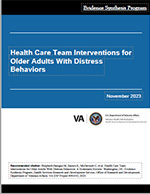
|
Recommended citation: |
Download PDF: Complete Report, Executive Summary, Report, Appendices
Interventions that aim to reduce distress behavior among older adults which include strengthening of health care worker (HCW) skills and role responsibilities along with changing HCW patterns of interactions with patients have beneficial impact on patient quality of life and reduce antipsychotic use. This is despite only non-significant reductions in distress behaviors themselves. These interventions are quite complex and involve addressing multiple, frequent actions and activities for HCW and require support at the team, clinic, and facility leadership levels. Little has been reported about the effect of such interventions on key outcomes such as staff burnout and utilization.
Older adults with complex medical disorders (ie, dementia, serious mental illness, multiple chronic medical conditions) may experience distress behaviors (eg, physical or verbal aggression, repeated vocalizations, disengagement). To better address underlying and unmet patient needs and reduce distress behaviors in a productive and safe work environment, it is imperative that health systems develop evidence-based, effective approaches to support and prepare health care teams around this aspect of high-quality patient care.
Among the 43 studies identified in long-term residential settings, 3 were designed to change patient-facing HCW interactions only, 6 focused on HCW training, roles, and activities only, 17 included both patient and HCW-focused activities, and 3 included HCW, patients, and environment-focused activities. The 3 interventions of patient-facing HCW interactions showed mixed results on agitation. The 6 interventions focused on HCW knowledge and activities only demonstrated short-term improvements on distress but not long-term, and no evidence of improvement in quality of life or in antipsychotic use. The 17 interventions of patient-facing and HCW activities showed a significant reduction in antipsychotic use, improvement in quality of life, and non-significant reductions in distress behaviors. Of the 3 interventions that included HCW, patient, and environment-focused activities, 1 intervention showed improvement in agitation in the short term but not in the long term. Antipsychotic use did not change. No health care utilization outcomes were reported.
Ramos K, Shepherd-Banigan M, McDermott C, et al. Health Care Team Interventions to Reduce Distress Behaviors in Older Adults: A Systematic Review. Clinical Gerontologist. Published online July 2, 2024. DOI: https://doi.org/10.1080/07317115.2024.2372424.
Healthcare Team Interventions for Older Adults with Distress Behaviors (Management Brief)